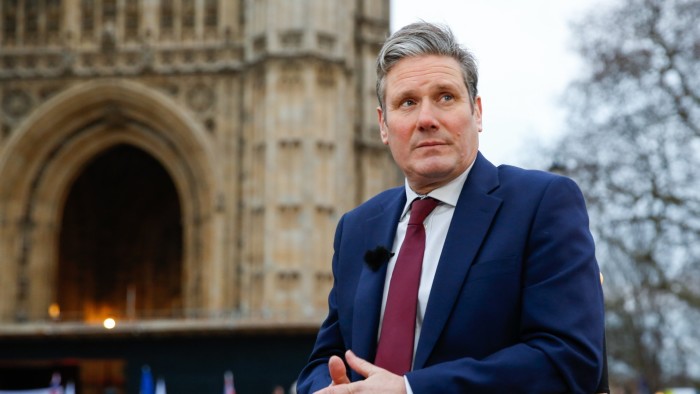This article is an on-site version of our Inside Politics newsletter. Subscribers can sign up here to get the newsletter delivered every weekday. If you’re not a subscriber, you can still receive the newsletter free for 30 days
Good morning. The Labour government has reached a deal that gets Britain closer to the EU ahead of a summit in London today. Some thoughts on the politics of the agreement in today’s note.
Inside Politics is edited by Georgina Quach. Follow Stephen on Bluesky and X, and Georgina on Bluesky. Read the previous edition of the newsletter here. Please send gossip, thoughts and feedback to insidepolitics@ft.com
Paris is worth a mass
Labour has struck a deal that reduces some barriers and bureaucracy from trade between the UK and its nearest, largest and most important trading partner. So, progress.
The party has shown willingness to take political lumps on the emotionally resonant subject of access to UK fishing waters (though in practice, a lot of what is eaten in the UK is fished outside of UK waters and what is fished in UK waters is sold outside of it, so this isn’t quite the blow to UK fishing as some diehard opponents of any kind of decent trading relationship with the EU will paint it as). It has, rightly and sensibly, sacrificed some regulatory autonomy for an enduring deal for some sectors. And in opting to extend EU access to British fishing waters for 12 years, up from a previous offer of five, in exchange for a permanent agreement on agrifood, the government has secured a good deal for the UK.
But for most of the British economy the barriers and costs of Brexit still remain. While Labour has plenty of committed, I-am-willing-to-lose-votes-for-Europe types in its ranks, the party’s centre of gravity is much closer to a position of “no votes lost for the EU” and “I am pro-European as long as I don’t have to bear electoral costs for it”.
A reflection of that can be found in Labour’s senior parliamentarians. Keir Starmer and Rachel Reeves were both relatively late converts to the second referendum cause. Starmer started the 2017 parliament telling people that Brexit couldn’t be stopped and wanting to keep the Labour party together. Yvette Cooper never became an advocate for a second referendum on Brexit. But David Lammy and Pat McFadden were early adopters (and, of course, that position was far braver and more difficult for McFadden, whose seat Wolverhampton South East had many more Leave voters in it).
While some ministers — not least Reeves in her recent trip to the US and her Mansion House speech last year — have explicitly acknowledged that the EU is our most important relationship and that Brexit has hurt us, not all ministers have or ever will.
The final agreement that will be struck between the EU and the UK will, ultimately, reflect Labour’s two camps, between committed pro-Europeans and “well, as long as it doesn’t cost me votes” pro-Europeans. As new FocalData polling for the think-tank British Future demonstrates, the outlines of this deal will get the UK closer to the EU, but it is far from anything that will cause Labour electoral difficulties.
That is true even of the youth mobility scheme, the most politically tricky bit of the negotiations for the UK (the wording about a proposed youth mobility scheme discussed overnight indicated the two sides would “work towards” a deal on it, according to EU diplomats).

Unless there is some kind of radical revolution within Labour, of a kind bigger even than Jeremy Corbyn’s takeover of the party, Labour is not going to become a full-throated advocate of a closer relationship with Brussels across the board. Even its support of this deal is going to be muted. The argument that we are better off with closer ties will have to be made by other parts of civic society — and that creates an opportunity for Labour’s opponents, both for parties such as the Liberal Democrats that want to get closer, and for parties that want to argue that this new deal is a Brexit betrayal.
Now try this
I saw The Uninvited at the cinema this weekend and I did not care for it at all. It looked great, and it had some lovely individual performances, but the script itself was a complete mess. Danny Leigh’s more favourable review is here.
Top stories today
-
Trump-proofing British science | The UK’s scientific institutions are stepping up investment plans in the face of attacks on research by Donald Trump’s administration, unveiling 10-year official funding guarantees and fellowships open to experts fleeing the US.
-
Legal aid hack | A “significant amount” of personal data from legal aid applicants has been accessed by hackers after a cyber attack on England and Wales’s Legal Aid Agency, leading the body to suspend its online service.
-
‘Low-politics, high-impact’ | A deal with Brussels allowing British goods to be exported to the EU without further tests or certificates would increase UK exports to the bloc by an average of a tenth, and by more than a quarter for some sectors, new research has found.
-
Regulating the ‘wild west’ | Lenders that specialise in “buy now, pay later” services will have to abide by the same rules as mainstream banks under long-awaited legislation that will result in them being fully regulated by the Financial Conduct Authority.




